|
|
|
Sort Order |
|
|
|
Items / Page
|
|
|
|
|
|
|
| Srl | Item |
| 1 |
ID:
056360
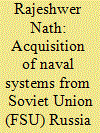

|
|
|
| 2 |
ID:
169762


|
|
|
|
|
| Publication |
New Delhi, IDSA, 2019.
|
| Description |
38p.pbk
|
| Series |
IDSA Occasional Paper no; 52
|
| Standard Number |
9789382169840
|
|
|
|
|
|
|
|
|
|
|
|
Copies: C:2/I:0,R:0,Q:0
Circulation
| Accession# | Call# | Current Location | Status | Policy | Location |
| 059780 | 629.1/KAU 059780 | Main | On Shelf | General | |
| 059781 | 629.1/KAU 059781 | Main | On Shelf | General | |
|
|
|
|
| 3 |
ID:
127730
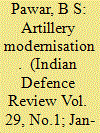

|
|
|
|
|
| Publication |
2014.
|
| Summary/Abstract |
With changes in policy clearly stating that in all future acquisitions of defence equipment, the first priority would be given to Indian companies both private and public, a number of private companies such as L&T, Bharat Forge, Mahindra Defence Systems, Tata Powers and Punj Lloyd have taken the plunge and are forging JVs with renowned global defence equipment manufacturing companies especially those related to manufacture of 155mm/52 caliber artillery Howitzers of all types. There is also an urgent need to quickly revise the present blacklisting policy of the government which is retrograde in its application and is doing more harm than good to the procurement process. Imposing of severe financial penalties on the company rather than banning, would yield better results and ensure that the acquisition of major/critical weapon systems does not suffer - an existing practice in many countries. The Naresh Chandra Committee on defence reforms has addressed this issue and the Government must act on it.
|
|
|
|
|
|
|
|
|
|
|
|
|
|
|
|
| 4 |
ID:
172773


|
|
|
|
|
| Summary/Abstract |
The goal of any procurement process is to obtain ‘value for money.’ Bid protest systems are intended to help. The U.S. Department of Defense, NATO, the EU, UN, OECD, and WTO, all authorize losing bidders to protest public procurements. The threat of a protest is meant to increase government accountability, and encourage vendor participation. An extensive legal and regulatory literature discusses intended benefits of protests, but is surprisingly silent about the costs. The goal of this study is to examine both costs and benefits. Military acquisition offers an illustration. The dual objective is to minimize corruption, and maximize competition. Sadly, protest systems can inadvertently discourage both. Moreover, past protests by defense companies have generated significant costs, and triggered dangerous delays of critical defense equipment, materiel, services, and supplies required for national security. The static, probabilistic, micro-economic, partial equilibrium, representative bidder model presented in this paper offers a cautionary tale for defense organizations, government agencies, countries, and international institutions that authorize bid protests. The model reveals multiple potential deficiencies of protest systems, and recommends analysis of portfolios of alternatives to eliminate fraud and favoritism, and increase competition, to improve procurement outcomes.
|
|
|
|
|
|
|
|
|
|
|
|
|
|
|
|
| 5 |
ID:
104739
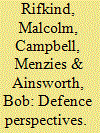

|
|
|
|
|
| Publication |
2011.
|
| Summary/Abstract |
The SDSR has been praised and derided in almost equal measure. In some cases, the government grasped the nettle, making difficult choices about current and future procurement and acquisition; in others, it appeared to fumble, hamstrung by constrained political will and inter-service competition. As the dust settles, RUSI asks three former defence representatives from each of the main political parties for an evaluation of the review's process and conclusions.
|
|
|
|
|
|
|
|
|
|
|
|
|
|
|
|
| 6 |
ID:
160721
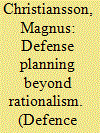

|
|
|
|
|
| Summary/Abstract |
This article analyzes U.S. defense planning, and more specifically the public administration of the third offset strategy. The U.S. defense bureaucracy is rooted in a tradition of rational planning, which assumes a process of consistent, value-maximizing choices within specified constrains. The cornerstone in this tradition is the program budgeting system, once created to connect plans with budgets according to preferences. The third offset strategy, aimed at dealing with the challenges of geopolitical competition and budget austerity, is influenced by a different public administration philosophy described as metagovernance. Metagovernance is a challenge to rational planning as it entails an indirect approach of organizing arenas for networks, in which start-up companies and civilian corporations get to interact with government officials in order to identify incrementally suitable acquisition projects. Furthermore, the article contextualizes this tendency in reflexive modernity, in which rationality breaks down due to the pace of societal changes and planning processes constantly become subject to feedback.
|
|
|
|
|
|
|
|
|
|
|
|
|
|
|
|
| 7 |
ID:
121681
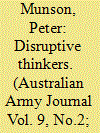

|
|
|
|
|
| Publication |
2012.
|
| Summary/Abstract |
B
enjamin Kohlmann's essay, "The Military Needs More Disruptive Thinkers,"1
struck a chord like no other essay published recently in the Small Wars
Journal. In brutal honesty, I have to say that the many sniping comments
struck exposed flesh. While an ardent fan of Kohlmann's essay, I have to agree that
his argument was more akin to birdshot at maximum range than a mailed fist to
the throat of the problem. Perhaps a better analogy is that his was a marking round
lobbed in the general vicinity of the problematic enemy fire. Whatever it was, it was
a wildly popular read. For all the comments on the article, the one that rang truest
with me came from commener "Null Hypothesis" and asked, "What problem are
we trying to solve again?" This was absolutely the right question.
|
|
|
|
|
|
|
|
|
|
|
|
|
|
|
|
| 8 |
ID:
167176
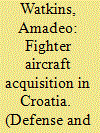

|
|
|
|
|
| Summary/Abstract |
The possibility for Croatia to obtain new fighter aircraft is not new, as this option has been publicly debated for at least a decade. A sudden decision to advance the acquisition of a limited number of fighter aircraft was made in 2017 with an international tendering process concluding in early 2018. Through open source material, this paper will look at this procurement process by examining the relationship between policy and strategic thinking on the one side, and policy delivery on the other, and evaluate why the tendering process failed in achieving envisaged results. The paper concludes that the problems facing the Croatian aircraft acquisition process stem from at least two interrelated factors: firstly, at the operational level, the failure of the procurement was the direct result of mismanaged tendering procedures linked to the wider public administration reform process; and secondly, at the strategic level, inherently complex civil-military relations and related cultural aspects which have not been adequately addressed over the past decades. The result was a failure to deliver on government policy, something which this paper argues will need to be addressed over the medium to long term.
|
|
|
|
|
|
|
|
|
|
|
|
|
|
|
|
| 9 |
ID:
137873
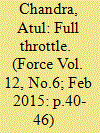

|
|
|
|
|
| Summary/Abstract |
Military aero-engines have very long service lives as a result of the enormous expense in designing and developing state-of-the-art aero-engine technology. The Indian Air Force (IAF) by virtue of having a large fleet of legacy fixed and rotary wing platforms, still operates and maintains types which have their technology origins in the late Sixties. Unlike most air forces world over, which are standardising their aircraft fleets with fewer types, the IAF will enter the next decade with a multiplicity of platforms and associated engine technology. We take a look at the military aero-engines that will join the Indian armed forces over the course of this decade and those already in service along with the technologies and benefits that they offer
|
|
|
|
|
|
|
|
|
|
|
|
|
|
|
|
| 10 |
ID:
106744
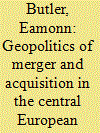

|
|
|
|
|
| Publication |
2011.
|
| Summary/Abstract |
In September 2007 the Austrian oil and gas company, OMV, issued a declaration of intent to merge with its Hungarian competitor, MOL. The merger was regarded by MOL as a hostile takeover bid and it initiated a series of measures designed to defend its independence and position within the Central European energy market. These measures, while intended to shore up MOL's defences in the face of an increased threat of merger and acquisition from larger companies aided by the demands of the EU to liberalise the energy market, reflect the rising instance of economic nationalism within the EU and have specific implications for the promotion of solidarity at an EU level. At the same time they also reflect the increased securitisation of energy. This is important when you consider that the actions of multiple players in the battle for MOL, including Russia through involvement of Surgutneftegaz following its purchase of a series of MOL shares in March 2009, has effectively created an energy security dilemma, whereby the actions of one actor to increase its own security leads to retaliatory actions by a second actor threatened by the actions of the first. Within the Central European energy market this is happening on multiple levels and impacts the relations between EU member states, the EU and Russia. The article uses the MOL case to highlight how the geopolitics of merger and acquisition in the Central European energy market means it effectively operates in a state of persistent insecurity.
|
|
|
|
|
|
|
|
|
|
|
|
|
|
|
|
| 11 |
ID:
159102
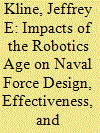

|
|
|
|
|
| Summary/Abstract |
Focusing on the packages delivered rather than the delivery platforms will allow us better to leverage
new technologies in the 2030 time frame.
|
|
|
|
|
|
|
|
|
|
|
|
|
|
|
|
| 12 |
ID:
110798
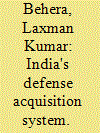

|
|
|
|
|
| Publication |
2012.
|
| Summary/Abstract |
India's defense acquisition system has evolved over the years and now consists of
hierarchical and institutional structures and detailed procedures. The evolved system
has created an atmosphere for undertaking acquisition in a more methodical,
process-oriented and objective manner. The success of the evolved system is evident
from its ability to execute orders worth billions of dollars every year. However,
despite all the success of the evolved system there are certain weak areas that demand
reforms to make the system more accountable and deliver within a prescribed time
frame by optimally utilizing the available resources. Among others, the arms
acquisition needs to flow from a strong planning process that is presently constrained
to bring in the required inter- and intra-service prioritization of weapons acquisition
and ensure holistic development of national capability. The formulation of weapons
systems' requirements-a critical stage of the acquisition cycle, which is presently
carried out within the individual armed forces with inherent weaknesses-needs to
be undertaken preferably by a dedicated and professional body. The accountability
of acquisition also needs to be strengthened by bringing about a centralized, integrated
and professional agency with the responsibility of ensuring timely acquisition.
|
|
|
|
|
|
|
|
|
|
|
|
|
|
|
|
| 13 |
ID:
054949
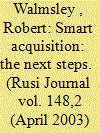

|
|
|
| 14 |
ID:
097382
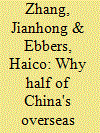

|
|
|
|
|
|
|
|